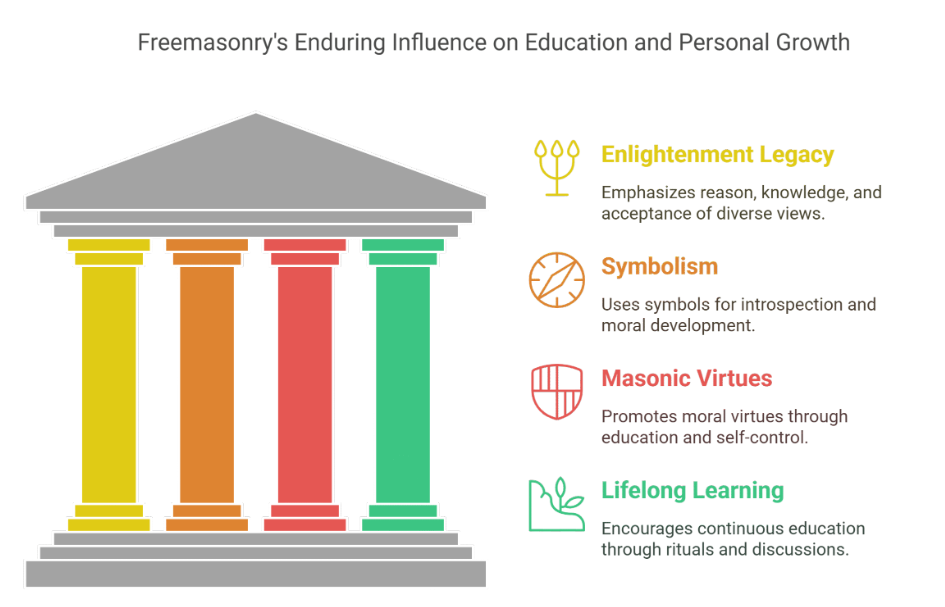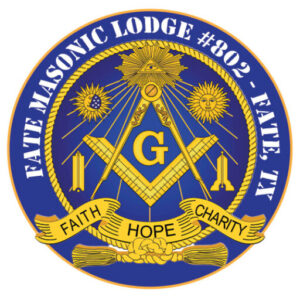
Often referred to as a “peculiar system of morality, veiled in allegory and illustrated by symbols,” Freemasonry has historically served as both an intellectual community and a brotherly society. It has long placed a strong emphasis on moral development, intellectual inquiry, and introspection in its rituals, lectures, and philosophical teachings, all of which have a direct bearing on both educational progress and individual growth.
- The Legacy of Enlightenment: Masonic Underpinnings of Free Thought
Freemasonry prospered during the Enlightenment, a period marked by reason, science, and the questioning of established authority. Many of Freemasonry’s tenets are consistent with enlightened ideals:
Reasoned investigation over doctrine
Knowledge advancement via instruction and discussion
Acceptance of different opinions and beliefs
Masonic lodges developed into hubs of scholarly discourse where opinions on philosophy, ethics, science, and government were discussed. Masonic lodges still promote reading, debate, and moral investigation among their members, demonstrating the enduring nature of this intellectual heritage.
- Allegory and Symbolism as Instruments for Introspection and Development
Masonry utilizes symbolism as a teaching tool, drawing inspiration from sacred texts and architecture. Symbols for moral conduct and self-improvement include the square and compasses, the ashlar stone, and the tools used by stonemasons.
These symbols encourage introspection and are more than just ornamental.
For instance:
The rough ashlar symbolizes the raw self at the beginning of life’s journey.
The ideal ashlar represents the person who has been refined via training, self-control, and life experience.
By encouraging Masons to “polish” their character through education, introspection, and action, this metaphoric system encourages a life of ongoing self-evaluation and development.
- The Masonic Virtues: The Moral Imperative of Education
The cardinal virtues of temperance, fortitude, prudence, and justice are taught by Freemasonry and are developed via education and self-control. Furthermore, the Mason is guided toward a life of service and humility by the theological virtues of faith, hope, and charity.
These qualities promote
Studying and reading to gain wisdom (prudence)
Moral fortitude in the face of injustice or ignorance
Time and talent management in balance (Temperance)
Active participation in societal improvement (charity and justice)
Therefore, education is a lifelong commitment based on virtue rather than a limited endeavor.
- The Lodge’s Lifelong Learning: Ritual as Ongoing Education
Rituals are used by Freemasonry as instruments for organized learning as well as for ceremonial purposes. A Mason receives additional information, moral lessons, and symbolic teachings at each degree. We must learn, assimilate, and manifest these in our daily lives; we cannot accept them passively.
The degrees’ progressive structure is a reflection of formal educational methods, in which mastery of earlier subjects leads to advancement.
Educational officers at lodges frequently do the following:
Give lectures on history, philosophy, and symbolism.
Encourage conversations about current events and ethics.
Promote study groups and guidance.
This approach offers a framework for growth that is supported by peers and keeps the mind engaged and active.
- Fostering Scholarship and Literacy Masonic lodges have historically aided in education in the following ways:
The creation of reading rooms and libraries
The establishment of educational institutions and scholarships
Promoting secular knowledge and public education
Prominent Masons who wrote extensively on philosophy, religion, and morality include Manly P. Hall, William Preston, and Albert Pike. Scholars are currently studying these writings. These writings frequently support education as a moral obligation, tying academic endeavors to spiritual development.
- Self-Governance and Moral Autonomy
Personal responsibility is highly valued in Freemasonry. There is no outside force telling you what to think or what to believe. Rather, Masons are urged to use reason to find the truth, to challenge their presumptions, and to strengthen their knowledge via research and discussion.
This arises:
Critical thinking abilities
Moral reasoning
Intellectual modesty
These attributes are essential for both personal development and making a significant contribution to society as well-educated, considerate citizens.
- Community-Based Learning: Fraternity and Growth
Additionally, via fraternity and mentoring, Freemasonry promotes education. Senior Masons frequently mentor incoming members, assisting them in comprehending the craft’s philosophical foundations as well as ceremonial aspects.
The lodge offers a secure setting for debate, idea sharing, and public speaking. In the process, it creates
Communication confidence
Respect for varying viewpoints
Social and interpersonal abilities
The notion that education is a social and individual endeavor is strengthened by this group learning.
Freemasonry offers a timeless road map for contemporary people looking to grow personally: to understand oneself, to get better every day, and to inspire others by virtue and knowledge.

